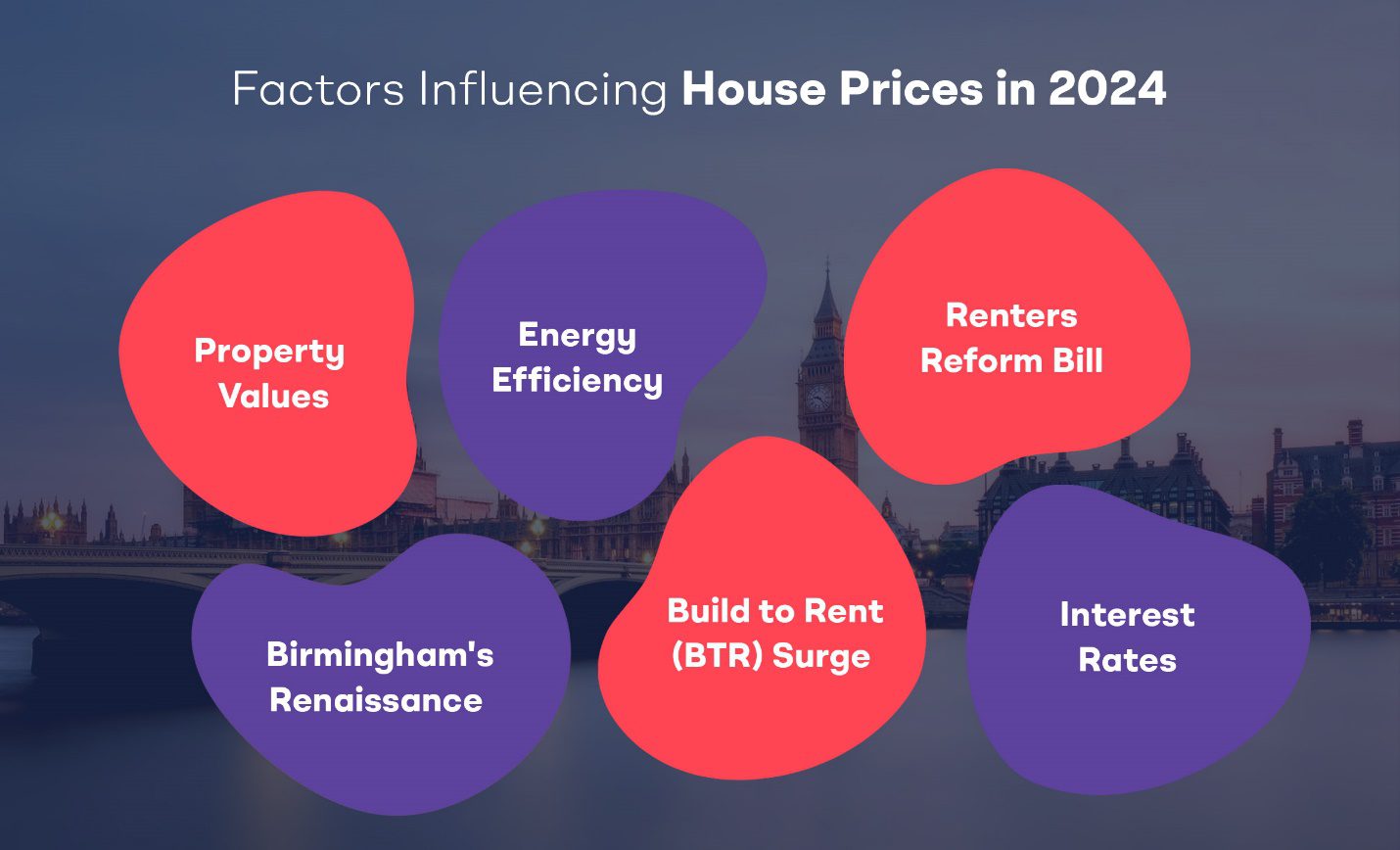Many people are concerned about the stability of the real estate sector going forward in light of the considerable changes in the economic environment. Understanding the effects of current developments and foreseeing new trends is increasingly important as 2024 draws closer.
According to recent estimates, uncertainty reigns as the average UK house price falls by 5.3 percent in August 2023, marking the largest yearly loss in 14 years. The average property value has decreased significantly from the peak of the previous year to £279569 as a result of this decline. In addition, predictions from credit rating firm Moody’s suggest that a 10% decline in housing values over the next two years is possible. They warn that a more serious property market slump might possibly trigger a protracted recession. Rising interest rates and chronically rising inflation have been cited by experts as major causes of this downward trend. The trends in the UK house prices in 2023 will certainly affect the house prices in the upcoming year.
Let’s explore how the housing market is likely to be in 2024. Will it be more stable in the coming year?
Moody’s Alert: 10% Declination
In a warning letter, credit rating firm Moody’s projected a possible 10% decrease in UK home values over the following two years. This gloomy prediction stems from worries about how inflation and rising interest rates will affect the property market.
The Threat of a Serious Recession
In terms of risk assessment, Moody’s raises a red flag about the possibility of a significant drop in home prices, which may reach a challenging 21%. If such a scenario occurs, it would have significant repercussions.
The grim possibility of an extended recession hanging over the economy is foremost among these. Under this scenario, the UK might have to deal with a recessionary phase that lasts for up to six quarters.
The effects of this recession would inevitably spread to many industries and have an effect on employment rates. While unemployment rates could increase, they are still expected to be below the peak seen during the global financial crisis of 2008-09.
In essence, Moody’s emphasizes the complex interaction between housing market dynamics and the larger economic environment, highlighting how the effects of a severe downturn go beyond just affecting property values and affect people’s livelihoods and financial well-being, as well as the health of the country as a whole.
Expert Advice and Opposing Points of View
Expert opinions on the future course of action differ. While some predict a slight comeback by the end of 2024, others are more pessimistic and say the rebound might not happen until the beginning of 2025. These viewpoints highlight the housing market’s complexity.
Exposure to Historical Trends
Analysing the historical data provided by Nationwide and Halifax, a clear pattern—a consistent decline in home prices—is revealed. This sharp drop stands in stark contrast to the ferocious price increases seen in previous years especially during the pandemic years when the government boosted investment by SDLT waiver and low-cost bounce back loans.
Projection and Forecasting
Three prominent voices in the field of housing forecasts, Halifax, Savills, and Nomura, have all offered their opinions on the course that UK house prices will take in the future. Their expectations cover a wide range, fluctuating between a mild 8% loss and a more aggressive 15% drop. These various forecasts capture the ongoing ambiguity that shrouds the market’s course.
Numerous factors are driving these advancements. Steadily rising inflation and increases in mortgage rates, have raised concerns about the need for a correction in the housing market. Market interest rates have increased as a result of recent inflation data as investors prepare for additional hikes in borrowing costs from the Bank of England.
It’s crucial to get an understanding of what the UK property market will look like in the future, given these unstable circumstances. Individuals and investors can make wise choices if they are aware of how market dynamics are changing.
The concern looms large in the midst of the evolving economic environment: Will the UK housing Market be more stable in 2024? The variables influencing market dynamics, prospective trends, and insights into the chances for stability in the upcoming year will all be covered in the parts that follow.
The Variables Influencing Market Dynamics in 2024

The year 2024 will bring a distinctive set of variables to the UK housing market, which investors and homeowners should carefully evaluate.
1. No Housing Crash on the Horizon
The absence of a forthcoming crash is one encouraging feature of the housing market in 2024. The UK housing market currently does not display the same amount of unregulated practices and consumer debt as in the circumstances preceding the 2008 crisis. Despite expectations of a decline in home values, a full-blown housing catastrophe shouldn’t be assumed to be imminent.
2. Predicted Dip in Property Values
According to projections, home values are anticipated to drop in 2024. Between 2023 and 2025, the Office for Budget Responsibility expects a 10% decline. For purchasers wishing to enter the market or make investments in real estate at more advantageous price points, this dip could bring opportunities.
3. Energy Efficiency is the Focus
In 2024, energy efficiency will be more important than ever as a factor for investors and purchasers. The minimum Energy Performance Certificate (EPC) rating for new tenancies will increase from E to C under new legislation that will take effect by 2025. Due to their compliance with these impending criteria, properties with EPC ratings of C or higher are in high demand. The current energy crisis and growing environmental consciousness both have an impact on this pattern.
4. Impact of the Renters Reform Bill
The UK lettings market is expected to undergo massive changes in 2024 thanks to the Renters Reform Bill, which is presently being reviewed by the parliamentary committee. The proposed legislation establishes periodic tenancies as the norm and seeks to create more equitable standards for both renters and landlords. This modification enhances the overall rental experience by giving tenants more flexibility and landlords more certainty.
5. Build to Rent (BTR) Surge
The year of build-to-rent (BTR) initiatives is expected to be 2024. These purpose-built rental communities are becoming more and more popular, and the industry is seeing major investment. Deals worth millions of pounds, including John Lewis’ £500 million undertaking and Moda Living’s 1,000-home construction, highlight the expanding need for BTR products.
6. Birmingham’s Renaissance
In 2024, Birmingham is expected to be a growth hub. The Central Birmingham Framework contains ambitious redevelopment plans that seek to completely change the city by 2040. These efforts focus on revitalising train stations, creating new neighbourhoods, and improving connections in general. Birmingham’s revival is anticipated to stimulate the local economy and real estate market.
7. Expert Opinions on Price Stability
Experts discuss the stability of housing prices in 2024. They contend that while costs might temporarily decrease marginally, they won’t likely fall drastically. Wage growth, interest rates, and their effects on affordability are important variables influencing this judgement.
8. The Role of Interest Rates
Interest rates continue to play a significant role in determining the direction of the housing market. The Bank of England’s monetary policy and interest rate decisions will have a significant impact on consumer confidence and the overall health of the market. The Base Rate is expected to peak out around the 6% mark which is not too far away from the current 5.25%. A large part of the pain seems to be over.
In Summary
The UK housing market is a canvas painted with both potential and problems as we look beyond the year 2024. For homeowners, investors, and potential buyers, the topic of stability in this changing environment continues to be crucial. While predictions call for a decline in real estate prices, it’s important to distinguish this from a full-blown housing crisis.
Property values might potentially decrease as early as 2024, according to projections. Between 2023 and 2025, the Office for Budget Responsibility forecasts a 10% decline. For those looking to enter the market or make real estate investments at more advantageous price points, this dip could present opportunities.
Due to upcoming laws that increase demand for homes with higher Energy Performance Certificate (EPC) ratings, 2024 will see the emergence of energy efficiency as a major trend. Build-to-rent (BTR) complexes are on the rise, and the Renters Reform Bill promises a more equitable environment for tenants and landlords. The ambitious reconstruction plans for Birmingham highlight its comeback as a hub for development. According to expert perspectives, significant determinants of housing price stability include things like wage growth and interest rates. Interest rates continue to be crucial in determining the direction of the market. The Bank of England’s monetary policy and interest rate decisions will have a significant impact on consumer confidence and the state of the market overall.
In this complex picture of potential outcomes and projections, there is one thing that is certain: the UK housing market in 2024 will stand out for its adaptability and durability. While there are still difficulties, there are opportunities too, and market participants must travel through this unpredictable terrain with caution and discernment. In the midst of the changing real estate market, the 2024 housing market is a journey distinguished by resiliency, flexibility, and the promise of stability.




